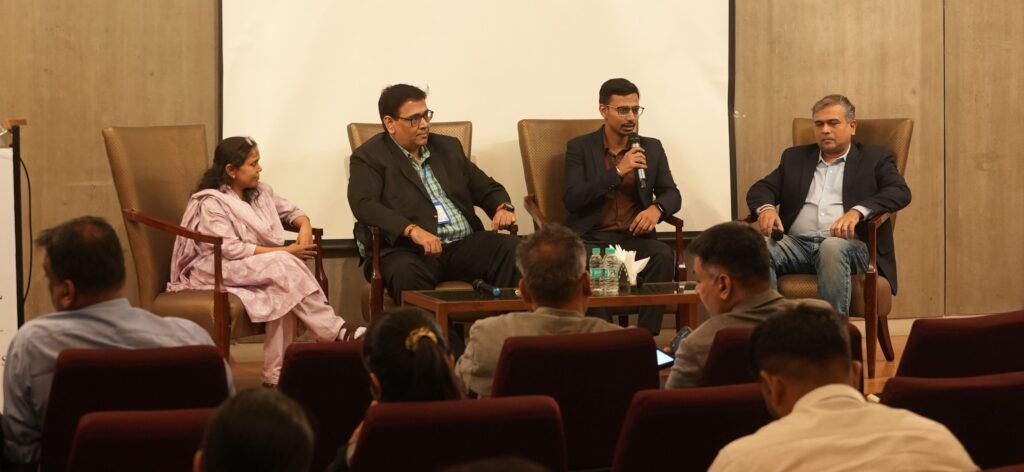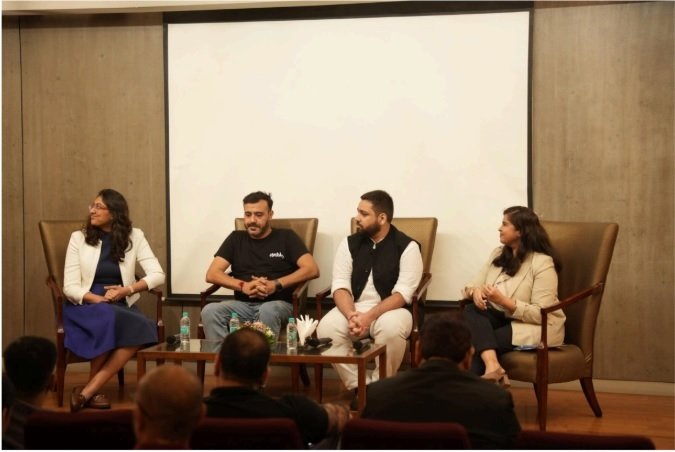Inside BENEO’s new pulse plant: pioneering sustainable protein from faba beans
Experts from the food and culinary sector took part in thought provoking panel discussions to discuss about the solution-focussed dialogue on lab grown chicken that is slowly gaining its entry in the Indian market. Excerpts
The Grand Finale of The Great Indian Cultivated Chicken Cook-Off (GICCC’25), hosted by Biokraft Foods, was recently held at DY Patil University, School of Hospitality & Tourism Studies, Navi Mumbai. NUFFOODS Spectrum India was the media partner for the event.
10 finalists took part in the appetiser-only challenge, creating four identical plates for the jury. The jury has Altamsh Patel, Director of Cukinary, Hilton Mumbai International Airport, Chef Ashish Thapliyal, WorldYoung Chefs Devt Ambassador, Middle East and North Africa, and others.

After an intense round of culinary creativity with cultivated chicken as the hero ingredient, the
winners were announced:
● First Prize (Rs 40,000) – Isaa Patel, Patkar-Varde College Department of Hospitality and
Catering
● Second Prize (Rs 30,000) – Shlok Khedekar, Patkar-Varde College Department of
Hospitality and Catering
● Third Prize (Rs 20,000) – Vedika Sakpal, DY Patil School of Hospitality & Tourism Studies
● Special Prize for Innovation (Rs 10,000) – Shravan Kadam, Kohinoor College of Hotel and
Tourism Management Studies.
Chef Demetrius Cordeiro D’Souza, NPD Chef, Biokraft Foods, stated, “As a chef, it is inspiring to see cultivated chicken, just like farmed chicken, being marinated, grilled, spiced, and plated with pride, using different techniques, in a commercial environment. This competition proves that innovation and tradition can share the same plate, thus opening doors to a
revolutionary culinary experience in the future.”
During the event, panel discussions were held on various topics.
The first panel discussion was held on the topic ‘Plating the Possible’. The theme for the panel was ‘The Future of Dining highlighted menu innovation, ethical sourcing, cultural relevance, and evolving dining experiences for the next era of food.’
The panel explored how chefs, food entrepreneurs, and culinary partners are rethinking what and how we eat. The session had Nilesh Lele, President, CASMB, and had speakers Dr Shalini Arya, AFSTI Mumbai Chapter, R Subramaniam, Founder & CEO, Freeze Fusion Foods and Kamalnayan Tibrewal, Founder & CEO, BioKraft Foods.

Tibrewal, Founder & CEO, BioKraft Foods thanked the students, all the mentors, partners etc, for conceptualising the event that took almost four months to make it a success. “When we began Biokraft Foods two years ago, our dream was to bring cultivated meat out of the lab and onto real plates. Watching these young chefs at The Great Indian Cultivated Chicken Cook-Off, embrace cultivated chicken with such creativity and confidence makes me believe that the future of food in India will be not only sustainable, but also ethical, delicious.”
Subramaniam, in his talk, mentioned that one should know what are various things are being put into it while preparing food. This is critical because, at the end of the day, food is being measured by how it’s going to taste. He said, “We should touch upon the food science, food technology part.”
Dr Arya opined, “Food is not just beautifully plated on the plate and decorated. More than decoration, it is science. So, shapes have to collaborate with food scientists because consumers want a food that is according to their desire, that is gut-healthy and nutritious.
The second panel discussion on the topic Food with a Conscience had the theme Meat, Morals & the Mission: Reimagining Protein for People & Planet. The panel had Sneha Singh, Managing Director, Good Food Institute, Mihir Davar from People for Animals Public Policy Foundation, Dhiraj Tejwani, CEO, Youth Organization in Defense of Animals, and Shreya Swaminath, Director at Humane World for Animals India. The session was moderated by Dr Ratnesh Jain, Founder ICT MRF (Mumbai Research Foundation).

Jain started off by saying that building a lot of ecosystems is needed to create or sustain innovation and give them to the society.
Singh from Good Food Institute, in her speech, started by saying that food is beginning to take centre stage and there is a need to think about food systems transformation. There are five countries in the world that have approved cultivated meat. According to her, countries like Singapore, the US, and Australia recently also awarded its cultivated meat approval, which was a really good green signal in the right direction.
Davar, during his talk, mentioned, “There are three pillars that dictate how India eats food. Number one is price, number two is accessibility, and number three is culture. Because in a market that is pre-commercialisation right now. Prices are going to be incredibly high. There is not going to be enough scale.”
Shreya Swaminath mentioned, “We need to build critical messaging and promote alternative proteins. So, I think in terms of putting forward policies, we are at a very early stage when it comes to something like cultivated meat. I think we definitely need more government support.”
The third panel discussion was on The Food Tech Frontier had the theme, ‘Science, Safety & the Future of What We Eat.’ The session delved into the high-stakes space between innovation and consumer trust, touching on themes like food safety, labelling, transparency, scale, and the balancing act between cutting-edge science and public perception.
The session had Ashwin Bhadri, Founder, Equinox Labs, Kshitij Neelakantan, Co-Founder, Naagin Sauce, Arun Luthra, Managing Director, Amerging Technologies, and Parag Vachhani, Senior Expert -Regional Commercial Applications APAC, MERCK.

Luthra from Amerging Technologies mentioned, “When we are talking about food, it’s a high volume, low cost product. One needs to be scalable only to be sustainable in the market. So, when we are talking about the scalability, we need to see how we can grow into a large bioreactor and how we can control the ecosystem, or in that environment where the cells can grow.”
Vachhani from Merck opined, “When we go for scaling up, what we achieve at the R&D stage, it has to be scaled up to a level where we can reach the market. We have to respect all the global guidelines, and for that, whatever the testing and the monitoring we do, it has to be transparent, it has to be so innovative nobody can challenge the data.”
Neelakantan from Naagin said, “People are conscious of what they are putting in their body. They are worried about safety. I have brands reaching out to us, showing our own test certificates that they have downloaded (15:08) from somebody else’s website and asking us if this is authentic.”
The event ended with speakers agreeing on how innovation can play a huge role in keeping consumers’ preference in mind, better marketing tools, and having the right set of automation, technology.
Sanjiv Das
sanjiv.das@mmactiv.com

